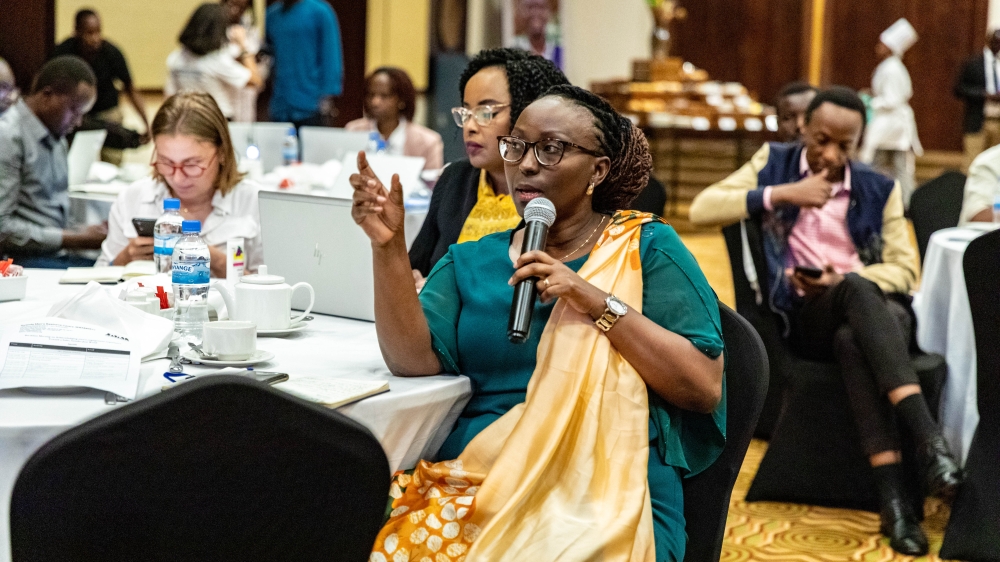

Rwandan fathers are increasingly playing an active role in caregiving, taking part in tasks like family planning, emotional support for children, and caring for elderly relatives, according to the State of Rwanda’s Fathers (SORF) report, released by the Rwanda Men’s Resource Centre (RWAMREC).
The comprehensive report offers insights into how Rwandan men participate in care work and how this involvement affects family dynamics, child development, and gender equality. The number increased to 14 per cent up from zero per cent.
Despite these positive changes, longstanding cultural norms and societal expectations continue to influence the distribution of household responsibilities, often placing a heavier caregiving burden on women.
ALSO READ: Gender transformation should be Rwanda’s goal to achieve equality – RWAMREC
During a breakfast meeting on November 19, held in celebration of International Men’s Day and emphasising men’s responsibility in promoting gender equality, findings revealed a growing trend of Rwandan fathers stepping up as active caregivers. However, the report highlighted that women continue to bear the majority of caregiving responsibilities, underscoring the urgent need for supportive policies to promote active fatherhood and greater male engagement in caregiving duties.
The report explores how Rwandan men are participating in caregiving, the impact on families, and the barriers to achieving gender equality in care work. To put this into perspective, the study reveals deeply entrenched social norms dictating the division of domestic work, particularly in caregiving responsibilities.
While an overwhelming majority of respondents—87.16 percent—believe that men should be involved in care and domestic work, a clear gap remains between expectations and reality. Although most people agree that men should take on more caregiving responsibilities, many men still contribute less than women to unpaid care work. Despite some positive shifts in attitudes and behaviors, the report underscores that men’s involvement is still insufficient to achieve a fair and equal distribution of caregiving duties.


In terms of planning family life logistics, both participants were asked about the time they spend planning logistics of family life such as setting up doctor appointments for family members, planning for vacations, and making parent-teacher appointments. 36 percent of women spend more than four hours on this task compared to 25 percent of men.
Compared to the COVID-19 period, 38 percent of women and 42 percent of men reported that their responsibilities now take less time than before.
Findings show that women (33 per cent) are more likely than men (15 per cent) to address children’s emotional and physical needs. When it comes to child-caring responsibilities women dedicate more than four hours daily to attend to the physical needs of their youngest child including changing diapers, bathing, feeding, dropping or picking them up from school, and taking care of them when they are sick.
ALSO READ: When culture meets activism in quest for gender equality
"Being a father is not just about providing; it’s about nurturing, sharing, and leading with care. When men embrace caregiving and positive masculinity, we build stronger families and inspire others to do the same. Every man has the power to make this change — it starts with us,” said Fidèle Rutayisire, Executive Director of RWAMREC.
He noted: "We are in a movement to change societal expectations placed on men, particularly social norms. However, we remain hopeful that the next generation will be more receptive and act accordingly.
"Currently, only 14 per cent of men are actively involved in family planning and support, up from zero per cent. This progress shows that with proper advice and the right approach, men can change,” he added.
The report also highlights the importance of supportive policies, such as expanded parental leave for men which could facilitate fathers’ engagement in caregiving.
Currently, fathers in Rwanda are entitled to a paternity leave of a week which restricts their ability to support their spouses and families during critical periods, including before and after the birth or adoption of a child.
The report recommends that policymakers consider extending paternity leave and incentivizing employers to support more flexible, family-friendly work environments.
However, some women have expressed skepticism about their husbands’ use of paternity leave, arguing that some misuse it for leisure rather than family care.
One woman from Kicukiro District shared her thoughts in a report, stating, "The way I see things out here is that it depends on the mentality of a person. There are some husbands who are lucky to get this paternity leave and they say ‘I&039;ve been missing going to the bar for so long so I'm going to use these days of the paternity leave and take as much alcohol as I want.’ On the other hand, others take paternity leave as an opportunity to take care of their wives and their newborn babies.”
Marie Médiatrice Umubyeyi, the Executive Secretary of the National Women’s Council, speaking on behalf of the Minister of Gender and Family Promotion (MIGEPROF), commended the report, highlighting men’s increasing role in caregiving.
She urged men to inspire others to embrace paternity leave positively, emphasising that encouraging a culture of gender equality could become a reality for future generations if nurtured well.
Furthermore, the report shows that when fathers are more involved in caregiving, it can lead to positive outcomes for children and families.
As noted by Rutayisire, children in households where caregiving responsibilities are more equitably shared, tend to have better emotional health and stronger family bonds. For mothers, having support with caregiving contributes to reduced stress and increased well-being.
The State of Rwandan Fathers report calls on communities, policymakers, and organisations to foster environments that support engaged fatherhood and promote shared caregiving responsibilities. With such efforts, Rwanda can move closer to achieving its goals of gender equality and social cohesion.


